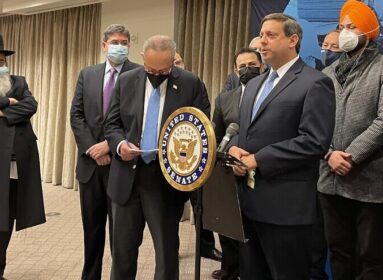West Hartford attorney Bob Katz was serving on the board of Jewish Family Services of Greater Hartford five years ago when he decided that he could be more helpful in a consulting role.
“I was always aware of the services JFS offered the community and always admired the work they did,” says the veteran divorce attorney. “I wanted to be more a part of the organization.”
Katz, a partner at Silver & Katz, LLC in West Hartford, became JFS’s “go-to” volunteer professional in the divorce world. In that role, he has worked to raise awareness among the local family law community about how JFS can help people going through divorce. He serves as a guide for JFS therapists who want to better understand the family-court process, accompanying them to hearings and introducing them to judges and social workers.
JFS therapists can contact Katz on behalf of their clients for help with divorce-related questions, and Katz refers his clients to JFS as they navigate through divorce. “I tell them that it will be stressful; there are a number of things they’ll go through as individuals that they’ll need a support system for,” he says. “We are fortunate to have wonderful resources in the community, all available at JFS – individual counseling, support groups, co-parenting programs, financial planning.”
Indeed, most Jewish Family Service agencies in Connecticut provide affordable, sliding-scale divorce support, from individual and couple’s counseling, mediation and arbitration, to support groups, adding relevant programming in response to the needs of the respective communities they serve. There are groups for children of divorce and for single mothers, mediation services, even an innovative pre-marital program, “Before the ‘I Dos’” at Jewish Family Service of Greater Stamford, New Canaan and Darien.
Many JFS agencies – Greater Hartford, New Haven, Stamford – offer the two state-mandated co-parenting courses, Parent Education Program (PEP), and Focus on K.I.D.S. (Knowledge, Insight, Decisions, Solutions) for parents in high-conflict separation and divorce.
Katz, former president of the Connecticut Collaborative Divorce Group, sees JFS as a valuable resource for those who choose to pursue collaborative divorce. “Collaborative divorce offers people a way to diffuse the anger and desire to conquer so that they can go through the process reasonably and not damage their children,” he says. “All the JFS services are things I want to plug clients into, as part of the collaborative process.”
After facilitating the six-hour PEP workshop, staff at Jewish Family Service of Greater Stamford, New Canaan and Darien ask for input on additional divorce-related issues that participants want to explore. If more than one person cites the same issue, a group is formed, says Eve Moskowitz, director of clinical services. Moskowitz facilitates Focus on K.I.D.S. and is a trained divorce mediator who specializes in co-parenting plans.
In conjunction with the Connecticut Council of Family Service Agencies and the Connecticut bar Association, JFS works to educate area attorneys on the importance of collaborating with mental-health services, especially as part of the divorce process.
Nancy Lichtenberg, a licensed clinical social worker who counsels adults and couples at Jewish Family Services of Greater Hartford, facilitates the two programs at that location, part of a flexible “menu” of divorce-related counseling options offered under one roof.
“If people going through divorce want to make parenting decisions without too much court involvement because it’s expensive or can create an adversarial relationship, I recommend Focus on K.I.D.S. to them,” she says. “If their kids are having a hard time in the divorce process, I can refer parents to our child-guidance clinicians, and we clinicians can consult together.”
Lichtenberg counsels divorcing and divorced individuals in co-parenting strategies, and has worked with couples who decide to break up and shift their counseling focus to co-parenting. “As therapists, we cover any issue that comes up,” she says.
Lisa-Loraine Smith, executive director of Jewish Family Services of Greenwich, started a divorce-support group when she first came to the position eight years ago. As JFS was launching its Jewish Health and Healing Center, Smith and area rabbis were exploring needs of the Jewish community.
“There was a lot of divorce in the community and we decided that a program to offer support to people in that position would be valuable,” Smith says.
Since its inception, the weekly group draws between eight and 12 participants; people stay involved as long as they need. Rather than relying on a set curriculum, the discussion is based on issues raised by the group members. And just as JFS will create a program in response to a need in the community, so Smith will often arrange for an outside speaker if the divorce-support group wants to learn more about a specific topic.
Many group participants also choose to pursue individual or couple’s counseling at JFS, Smith says.
The group has proven valuable outside the meeting room, Smith says. “I’ve seen many new friendships develop among group members,” she says. “You can lose friends or see your social relationships change while you’re going through divorce, and this is a safe place where people feel really connected to each other. They don’t feel alone, they can talk about what’s really going on without feeling that others are looking down on them or thinking that they should have done something differently. They really get support from one another.”
Psychotherapist Melanie Rago, coordinator of Jewish Family Service of Westport-Weston-Wilton-Norwalk, echoes the observation. “We have been lucky enough to create friendships between people in our divorce-support group,” she says. “They become outside supports for one another.”
Although JFS agencies serve clients of all backgrounds and denominations, each also tends to maintain strong ties within the local Jewish community. “We have good relationships with the rabbis in the area,” says Lichtenberg. If a halachic issue comes up, for example, Lichtenberg can reach out (confidentially, of course) to an area rabbi for information. “We happen to have a Jewish staff, for the most part, and our non-Jewish staff has access to Jewish colleagues if they have a question,” she says. “People are more comfortable in a therapeutic setting when they don’t have to explain their culture.”
For more information contact your local JFS.
Comments? Email cindym@jewishledger.com







 Southern New England Jewish Ledger
Southern New England Jewish Ledger















